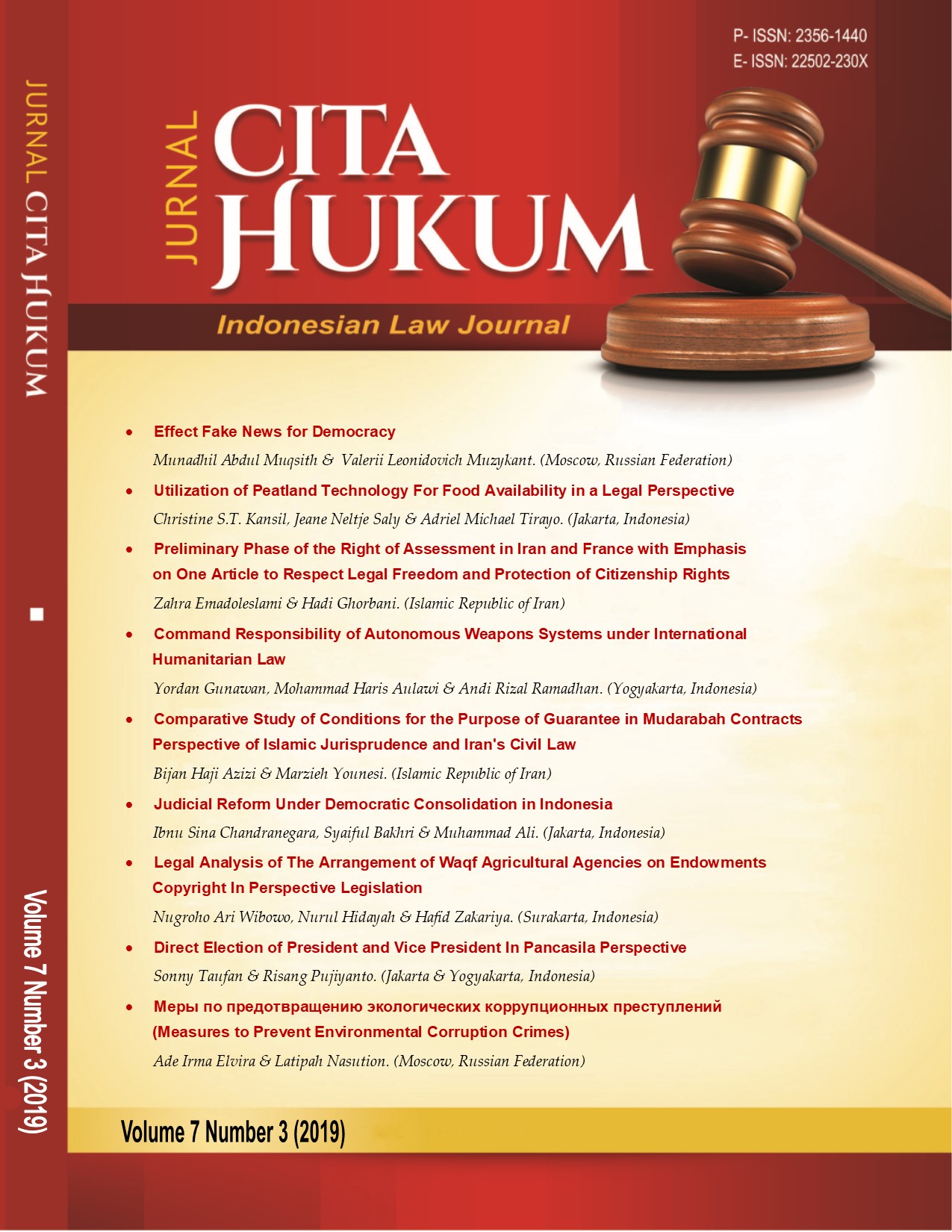The effectiveness of international conventions in the struggle against world’s domestic violence
DOI:
https://doi.org/10.15408/jch.v12i1.38889Keywords:
Protection of Human Rights, Prevention of Violence, Gender Equality, Legal Instruments, Victims of Domestic Violence, Cross-Cultural Studies, Social Support, Multidisciplinary ApproachAbstract
The issue of the spread of domestic violence is an urgent challenge to the modern legal system, which is regulated in particular by the adoption of international conventions. The research aim is to investigate the effectiveness of international conventions in combating domestic violence. Implementing the specified aim is based on the comparative analysis of specialised scientific literature, the use of content analysis and abstraction methods. The results show that the existing international conventions demonstrate their effectiveness if they are used in combination with other legal instruments for combating domestic violence. The main regulatory mechanisms for protection against domestic violence are restricted in the Convention on the Elimination of All Forms of Discrimination against Women and the Istanbul Convention. Separate international normative acts constitute an essential basis that became the foundation for the formation of relevant provisions in the systems of national legislation, which is especially noticeable in the examples of democratic EU countries. However, in the countries of Asia and Africa, there are critical indicators of domestic violence, which can also be explained by the fact that local governments have not ratified the relevant conventions. The conclusions emphasise that for the further effective implementation of international conventions and their integration into national legislation, it is essential that different groups of the population are aware of their provisions.
References
Afanasieva, N. (2023). Analysis of Methods and Tools for Visualising Anatomy in the Professional Training of Future Design Teachers. Futurity of Social Sciences, 1(2), 59–70. https://doi.org/10.57125/FS.2023.06.20.05
Alves, E., & Prado, P. (2021). Domestic violence against women and its impact on children's school performance. In International psychological applications conference and trends. inScience Press. https://doi.org/10.36315/2021inpact030
Baig, S. (2023). Change in physical and mental health due to aging: future perspective. Futurity Medicine, 2(1), 13–23. https://doi.org/10.57125/FEM.2023.03.30.02
Bobro, N. (2024). Key factors and structures of the development of the digital transformation of the economy. Věda a perspektivy, 1(32), 9-14. https://doi.org/10.52058/2695-1592-2024-1(32)-9-14
Bukauskaitė, J. (2023). Conceptualising domestic violence in the Istanbul Convention. In Understanding Domestic Violence as a Gender-based Human Rights Violation (pp. 70–96). Routledge. https://doi.org/10.4324/9781003350538-4
Buriak, I., Skaletska, Z., Rezvorovych, K., & Gigin, O. (2023). Future legal culture as an element of the legal system. Futurity Economics&Law, 3(2), 39–47. https://doi.org/10.57125/FEL.2023.06.25.03
Caragnano, R. (2017). Violence against Women and Domestic Violence: General Framework and Overview of the Convention (Articles 1 and 2). Athens Journal of Law, 4(1), 51–66. https://doi.org/10.30958/ajl.4-1-3
Council of Europe Treaty Series - No. 210, Council of Europe Convention on preventing and combating violence against women and domestic violence (2011). https://rm.coe.int/168008482e
Demir, E. (2021). The European Court of Human Rights’ Engagement with International Human Rights Instruments: Looking at the Cases of Domestic Violence. The Age of Human Rights Journal, (17), 79–96. https://doi.org/10.17561/tahrj.v17.6347
Douglas, H., & Fitzgerald, R. (2023). The Consequences of Criminalizing Domestic Violence. In The Criminalization of Violence Against Women (pp. 209–228). Oxford University PressNew York. https://doi.org/10.1093/oso/9780197651841.003.0012
Fornalé, E. (2023). Embracing Gender Parity at International and European Levels. In Preventing and Combating Violence Against Women and Domestic Violence (pp. 62–73). Edward Elgar Publishing. https://doi.org/10.4337/9781839107757.ch05
Freedman, J. (2021). Domestic violence through a human rights lens. In The Routledge International Handbook of Domestic Violence and Abuse (pp. 68–78). Routledge. https://doi.org/10.4324/9780429331053-8
Giesen, M. (2023). Framing gender-based violence in multi-level contexts: a networked approach to studying adoption of the Istanbul Convention. European Journal of Politics and Gender, 1–16. https://doi.org/10.1332/251510821x16693059192022
Graduszyńska, A., Augustynowicz, A., Borowicz, J., & Pihowicz, N. (2022). How Poland and Europe are fighting domestic violence towards women during the pandemic. Medycyna Ogólna i Nauki o Zdrowiu, 28(1), 82–85. https://doi.org/10.26444/monz/147242
Guney, G. (2020). The Istanbul Convention: A Genuine Confirmation of the Structural Nature of Domestic Violence against Women within a Human Rights Law Framework? In Preventing Sexual Violence (pp. 131–148). Policy Press. https://doi.org/10.1332/policypress/9781529203769.003.0009
Hagemann-White, C. (2017). Responses to Domestic Violence in Germany in a European Context. In Global Responses to Domestic Violence (pp. 87–105). Springer International Publishing. https://doi.org/10.1007/978-3-319-56721-1_5
Herbinger, P., Neinkirchner, M., & Leonhardmair, N. (2021). Frontline Response to High Impact Domestic Violence in Austria. In Improving Frontline Responses to Domestic Violence in Europe. University of Maribor, University Press. https://doi.org/10.18690/978-961-286-543-6.7
Htun, M., & Jensenius, F. R. (2020). Fighting Violence Against Women: Laws, Norms & Challenges Ahead. Daedalus, 149(1), 144–159. https://doi.org/10.1162/daed_a_01779
Kanbur, N. (2021). Istanbul Convention: Commitment to Preventing Gender-Based Violence. Journal of Adolescent Health, 69(2), 354–355. https://doi.org/10.1016/j.jadohealth.2021.05.009
Kubiv, S. I., Bobro, N. S., Lopushnyak, G. S., Lenher, Y. I., & Kozhyna, A. (2020). Innovative potential in European countries: analytical and legal aspects. International Journal of Economics and Business Administration, 8(2), 250-264. https://www.um.edu.mt/library/oar/handle/123456789/55870
Lazareva, A., Myroshnychenko, V., Sanakuiev, M., & Gontarenko, L. (2023). Philosophical discourse of information ethics of the future. Futurity Philosophy, 2(1), 14–29. https://doi.org/10.57125/FP.2023.03.30.02
Nguindip, N. C. (2023). Combatting Domestic Violence under International Law: Assessing the Various Legal Inconsistencies Frustrating the Protection of Women's Rights in Cameroon. African Journal of International and Comparative Law, 31(1), 86–103. https://doi.org/10.3366/ajicl.2023.0436
Niemi, J., & Sanmartin, A. V. (2020). The concepts of gender and violence in the Istanbul Convention. In International Law and Violence Against Women (pp. 77–94). Routledge. https://doi.org/10.4324/9780429289736-4
On Amendments to the Criminal and Criminal Procedure Codes of Ukraine in order to implement the provisions of the Council of Europe Convention on the Prevention of Violence against Women and Domestic Violence and Combating These Phenomena, Law of Ukraine No. 2227-VIII (2017) (Ukraine). https://zakon.rada.gov.ua/laws/show/2227-19#Text
On preventing and countering domestic violence, Law of Ukraine No. 2229-VIII (2023) (Ukraine). https://zakon.rada.gov.ua/laws/show/2229-19#Text
Picchi, M. (2022). Violence against Women and Domestic Violence: The European Commission’s Directive Proposal. Athens Journal of Law, 8(4), 395–408. https://doi.org/10.30958/ajl.8-4-3
Ranjan, S. (2019). Domestic Violence Legislation in Greece: Analysis of Penal Mediation. Women & Criminal Justice, 30(1), 42–68. https://doi.org/10.1080/08974454.2019.1646192
Robinson, P. H., & Robinson, S. M. (2022). Domestic Violence. In American Criminal Law (pp. 265–274). Routledge. https://doi.org/10.4324/9781003258025-23
Simović, M., Jovašević, D., & Simović, M. (2019). Prevention of domestic violence in the republic of serbia. Knowledge International Journal, 26(6), 1777–1782. https://doi.org/10.35120/kij26061777s
Szyszlak, E. (2022). Turkey’s Presence in the Convention on Preventing and Combating Violence against Women and Domestic Violence in the Context of Turkey’s Soft Power. Historia i Polityka, (40 (47)), 73–89. https://doi.org/10.12775/hip.2022.014
Tentoni, L. (2020). The Necessity of a Broader Discussion on Domestic Violence - An European Legislative View : A legal analysis of the Directive 2012/29/EU, The European Convention on Human Rights, United Nations Declaration on Elimination of Violence against Women and the Istanbul Convention on Violence Against Women [Thesis, Linköpings universitet, Tema Genus]. http://urn.kb.se/resolve?urn=urn:nbn:se:liu:diva-166659
UN WOMEN. Press Release: Devastatingly pervasive: 1 in 3 women globally experience violence. (2021). https://www.unwomen.org/en/news/stories/2021/3/press-release-1-in-3-women-globally-experience-violence
Vanzo, B. (2023). The Istanbul Convention. In Encyclopedia of Domestic Violence (pp. 1–11). Springer International Publishing. https://doi.org/10.1007/978-3-030-85493-5_915-1
Vozniuk, A. A. (2019). Criminal liability for domestic violence: Current issues of theory and practice. The Forum of Law, 55(2), 6–14. https://doi.org/10.5281/zenodo.2635559
Wemrell, M., Stjernlöf, S., Lila, M., Gracia, E., & Ivert, A.-K. (2021). The Nordic Paradox. Professionals’ Discussions about Gender Equality and Intimate Partner Violence against Women in Sweden. Women & Criminal Justice, 1–23. https://doi.org/10.1080/08974454.2021.1905588
Zayed Mohammad Al-Hawari, S. (2022). The criminal protection of women against violence: A study of Jordanian legislations and international conventions. Arab Journal for Security Studies, 38(1), 94–112. https://doi.org/10.26735/hxms1888
Zirojević, M., & Marković, D. (2020). Efficiency of Legal Solutions in Fight Against Domestic Violence. In Regional Law Review (pp. 195–210). Institute of Comparative Law; University of Pécs Faculty of Law; Josip Juraj Strossmayer University of Osijek, Faculty of Law. https://doi.org/10.18485/iup_rlr.2020.ch15











